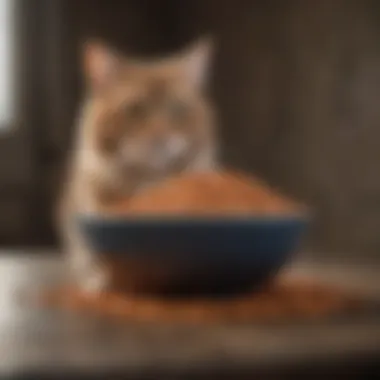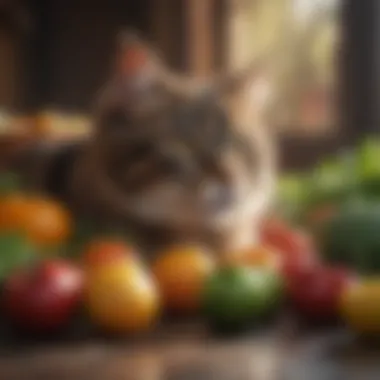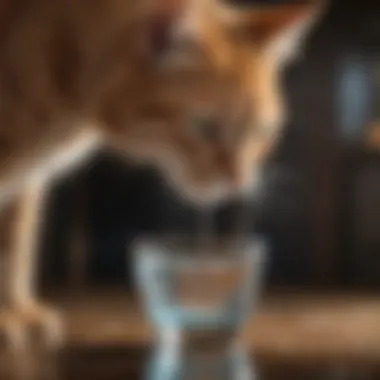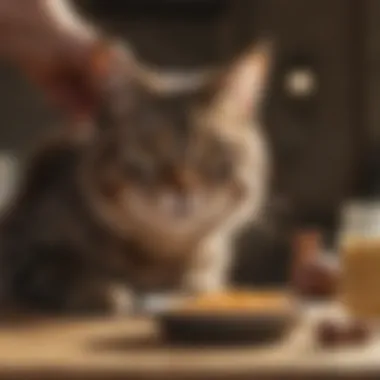Foods to Help Cats Poop: A Comprehensive Guide


Intro
Understanding a cat's digestive health is essential for pet owners. Ensuring that a cat can eliminate waste effectively impacts its overall wellbeing. Constipation in cats is more common than many realize, and diet plays a crucial role in managing it. This guide will uncover various foods that facilitate easier bowel movements. By focusing on fiber-rich ingredients and hydration strategies, cat owners can promote better digestive health.
Fascinating Facts About the Animal
Cats exhibit a variety of unique features and behaviors that make them intriguing companions. Understanding these aspects can enhance the pet-owner relationship while also emphasizing the importance of proper nutrition.
Unique Characteristics
- Carnivorous Diet: Cats are obligate carnivores, which means they primarily require meat to thrive. Their digestive systems are adapted to process animal-based proteins efficiently.
- Hydration Needs: Unlike some animals, cats do not have a strong thirst drive. They often obtain moisture from their food, especially if it contains high water content.
Extraordinary Abilities
- Hunting Skills: Cats possess remarkable hunting skills. Their agility and reflexes allow them to pounce and capture prey with precision.
- Grooming Behavior: Cats groom themselves to maintain hygiene and regulate body temperature, which can indirectly influence their digestion and constipation issues.
Recognizing Constipation in Cats
Before delving into foods that can aid your cat's digestion, it's critical to identify the signs of constipation. Common symptoms include:
- Straining to defecate
- Reduced frequency of bowel movements
- Hard, dry stools
- Discomfort or pain during elimination
Diet and Nutrition Strategies
A balanced diet can significantly impact your cat's digestive health. Key foods and ingredients to include are:
- High-fiber Foods: Incorporating sources that are rich in fiber can help to soften stools. Examples include canned pumpkin, wheat bran, and green beans.
- Hydration: Ensure that your cat has access to fresh water at all times. Wet cat food can also enhance moisture intake.
- Probiotics: Consider adding probiotics to your cat's diet. These beneficial bacteria can assist in maintaining a healthy gut microbiome.
Incorporating these dietary strategies will enhance your cat’s digestive health, thus helping to prevent constipation. Proper nutrition is fundamental, and recognizing potential issues early can lead to effective management.
Understanding Feline Digestion
Understanding feline digestion is essential for ensuring optimal health and well-being in cats. This section delves into the complexities of how cats process their food, the physiological aspects of their digestive system, and the potential issues that may arise. A deep comprehension of feline digestion enables cat owners to make informed dietary choices that support regular bowel movements and overall digestive health.
The Digestive System of Cats
Cats possess a unique digestive system that reflects their evolution as obligate carnivores. Their anatomy is designed to efficiently process meat, with a short digestive tract that allows for quick nutrient absorption. The stomach of a cat is highly acidic, which aids in breaking down animal proteins and kills harmful bacteria that could be present in raw meat. Moreover, the small intestine, which is relatively long for their body size, plays a crucial role in nutrient absorption.
The process of digestion begins in the mouth where cats chew their food. However, their chewing is not as pronounced as in herbivores or omnivores. Once swallowed, food travels down the esophagus to the stomach. In the stomach, food is mixed with gastric juices, and further breakdown occurs before it moves into the small intestine.
Additionally, the pancreas produces enzymes that assist in breaking down carbohydrates, proteins, and fats, while the liver produces bile, which helps in fat digestion. The large intestine then reabsorbs water and compacts waste into feces for excretion. Understanding this system highlights the need for a diet that matches a cat's natural eating habits and promotes healthy digestion.
Common Digestive Issues in Cats
Digestive issues in cats can present in various forms, ranging from minor discomfort to serious health concerns. Common problems include constipation, diarrhea, vomiting, and gas. These issues often stem from dietary factors, such as insufficient fiber intake or an unbalanced diet that does not meet a cat's nutritional needs.
Constipation is particularly common in cats, often manifesting as infrequent or difficult bowel movements. It can be caused by dehydration, low fiber intake, or underlying health problems. In contrast, diarrhea might indicate that a cat is eating spoiled food, has a food intolerance, or is suffering from an infection.
Furthermore, vomiting can occur due to indigestion, hairballs, or overeating. It is crucial for pet owners to observe their cat's litter box habits and any behavioral changes. If digestive issues persist, seeking veterinary advice is essential. Identifying the underlying cause early can prevent further complications, underlining the importance of understanding feline digestion for effective pet care.
By focusing on the unique aspects of feline digestion, owners can make dietary choices that significantly improve their cat's health.
Importance of Diet in Cat Health


A cat's diet holds significant importance in its overall health and well-being. It goes beyond mere sustenance; it is, in fact, a critical component of their quality of life. Nutrition impacts not just the physical health of the cat but also influences behavior, energy levels, and even longevity. Proper nutrition provides essential nutrients that support various body functions, including digestion, metabolism, and immune response.
Cats are obligate carnivores, which means their bodies are designed to derive nutrients primarily from animal sources. They require specific amino acids, vitamins, and fatty acids to maintain optimal health. A balanced diet featuring the right proportion of proteins, fats, and carbohydrates is essential for ensuring that felines remain healthy and active.
Nutritional Needs of Cats
Understanding the nutritional needs of cats is crucial for any cat owner. Cats need a diet high in protein—typically around 25 to 30 percent in their daily intake. Proteins are required for building and repairing tissues and in the production of hormones and enzymes. Furthermore, certain amino acids such as taurine and arginine are vital. Taurine, for example, supports heart and eye health, and a deficiency can lead to serious health issues.
In addition to proteins, fats provide essential fatty acids crucial for maintaining healthy skin and a glossy coat. Carbohydrates, while not as vital to a cat's diet, still serve as a source of energy.
Essential nutrients in a cat's diet include:
- Proteins (especially from animal sources)
- Fats (omega-3 and omega-6 fatty acids)
- Vitamins (A, B, D, E, and K)
- Minerals (calcium, phosphorus, and potassium)
- Water (crucial for digestion and hydration)
Consequences of Poor Nutrition
The consequences of poor nutrition can be dire. A diet lacking essential nutrients can lead to various health issues. Cats may experience malnutrition, which manifests as lethargy, weight loss, and a weakened immune system. Moreover, deficiencies in specific nutrients can result in serious conditions. For example, a lack of taurine can lead to heart problems or vision impairment.
Excessive carbohydrates can also lead to obesity and diabetes in cats. An unbalanced diet may cause digestive problems, such as constipation, due to inadequate fiber intake. Therefore, ensuring a well-rounded diet is essential for both preventive care and the overall health of felines.
A well-planned diet is a cornerstone for maintaining a cat's health, influencing its quality of life significantly.
Owners should focus on providing high-quality, nutrient-rich foods tailored to their cats' specific needs. Regular vet check-ups can also help assess dietary efficiency and address any arising nutritional concerns. By prioritizing diet, cat owners can foster a healthier, happier, and more vibrant life for their furry companions.
High-Fiber Foods for Cats
High-fiber foods play a crucial role in enhancing a cat’s digestive health. They assist in promoting regular bowel movements, thus helping to alleviate constipation. A fiber-rich diet can aid in the prevention of hairballs, which are common in felines. Understanding the significance of dietary fiber can empower cat owners to make informed choices about their pet's nutrition. By integrating high-fiber foods into their diet, owners can provide their cats not just with better digestion but also overall well-being.
Benefits of Fiber in Feline Diets
Fiber benefits a cat's digestive system in multiple ways. It promotes healthy stool formation and can help control weight by keeping cats feeling full longer. In addition, fiber helps regulate blood sugar levels, making it essential for cats, especially those with diabetes. The inclusion of adequate fiber in their diet supports a healthy gut microbiome. Consequently, a high-fiber diet can lead to fewer digestive problems and better absorption of nutrients.
Top High-Fiber Foods
Pumpkin
Pumpkin is renowned among cat owners for its digestibility and fiber content. Rich in soluble fiber, pumpkin contributes to better stool consistency. This makes it a popular choice in addressing constipation. Pumpkin is low in calories, making it suitable for cats that need to maintain a healthy weight. A key characteristic of pumpkin is its moisture content. While it promotes hydration, it is essential to choose plain, unsweetened varieties to avoid additives.
Green Beans
Green beans offer another excellent source of fiber. They are low in calories and can help maintain a cat's weight. High in vitamins and minerals, they support overall health. The texture of green beans can act as a satisfying snack. However, moderation is key. Overfeeding can lead to digestive upset. Generally, fresh or steamed green beans are recommended, while canned versions often contain sodium and additives.
Various Vegetables
Various vegetables provide a diverse range of nutrients and fiber. Options such as carrots and peas are great additions to a cat’s diet. Vegetables can offer important vitamins, supporting immune health. A key advantage of vegetables is their ability to encourage hydration through their water content. Nonetheless, not all vegetables are safe for cats, so it is important to research or consult with a veterinarian before introducing new ones.
Commercial High-Fiber Cat Foods
Many cat food brands now offer commercial high-fiber options. These foods are carefully formulated to meet the nutritional needs of felines while also providing adequate fiber. They can be particularly effective for cats who are picky eaters or have specific dietary restrictions. When choosing a commercial option, review the ingredient list to ensure high-quality fiber sources and avoid fillers that provide little nutritional value. Look for products from reputable brands, as they often undergo rigorous testing.
Hydration and Its Role in Digestion
Proper hydration is critical to overall health, especially when it comes to aiding digestion in cats. If a cat does not drink enough water, it can lead to various health issues including constipation. Understanding the role of hydration in feline digestion can help cat owners make informed decisions about their pets' diets and routines.


Importance of Water Intake
Water is essential for nearly all bodily functions in cats. It supports digestion, regulates body temperature, and helps remove waste. The feline digestive system relies on a certain amount of water to effectively break down food and absorb nutrients. Without sufficient water, food may become too hard or dense, making it difficult to pass through the intestines.
Cats that do not drink enough water may face not just constipation, but more severe health problems such as urinary issues, kidney disease, and even behavioral changes.
Here are some points to consider regarding the importance of water intake:
- Fluid Balance: Cats need a balance of fluids to maintain their bodily functions. This balance helps in the absorption of nutrients.
- Waste Elimination: Sufficient water intake aids in the elimination of waste, reducing the risk of constipation.
- Overall Health: Staying hydrated supports the health of organs, especially the kidneys and liver, which are crucial in processing waste.
Wet Cat Food vs.
Dry Cat Food
When it comes to choosing between wet and dry cat food, the moisture content can play a crucial role in hydration. Wet cat food typically contains about 70-80% water, making it an excellent choice for promoting hydration. In contrast, dry cat food often has a much lower moisture content, usually around 10%.
Here are some considerations when comparing wet and dry food for hydration:
- Moisture Content: Wet food provides a significant amount of water through the diet, while dry food requires cats to drink more water separately.
- Taste and Preference: Many cats prefer the texture and flavor of wet food. This might encourage them to eat more, improving hydration.
- Dental health: While dry food is sometimes marketed as being better for dental health, wet food can also provide some nutrition without being overly abrasive on the teeth.
Supplements for Digestive Health
The health of a cat’s digestive system can be influenced significantly by their diet. While many cat owners focus on regular foods, it is essential to consider supplements that can enhance digestive health. Supplements are not only helpful for cats already facing issues, but they can also promote overall wellness. Understanding the types of supplements and their benefits is vital in creating a comprehensive dietary strategy for your cat.
Fiber Supplements
Fiber plays a crucial role in digestion. It aids in maintaining bowel regularity and can alleviate constipation. For cats that are not getting enough fiber from their daily meals, fiber supplements can bridge this gap effectively. These supplements are available in different forms such as powders, capsules, or treats.
Key benefits of fiber supplements include:
- Enhanced Digestion: Fiber helps to bulk up the stool, making it easier for cats to pass.
- Weight Management: Fiber can help cats feel fuller, which assists in weight management.
- Gut Health: A diet rich in fiber supports a healthy gut flora, which is essential for proper digestion.
When selecting a fiber supplement, cat owners should look for options that contain natural ingredients. Common ingredients include psyllium husk and pumpkin powder. It’s recommended to consult with a veterinarian for suitable dosages and specific products appropriate for your cat's needs.
Probiotics and Prebiotics
Probiotics and prebiotics are crucial components in supporting gut health. Probiotics are beneficial bacteria that enhance the microbiome in the gut, while prebiotics are non-digestible fibers that feed these good bacteria. Together, they work to improve overall digestive function.
The advantages of incorporating probiotics and prebiotics include:
- Balanced Microbiome: They help restore balance in the gut, particularly after antibiotic treatments.
- Enhanced Nutrient Absorption: A healthier gut can improve the absorption of nutrients from food, bolstering overall health.
- Reduction of Diarrhea: Probiotics can help in stabilizing the gut, thus reducing instances of diarrhea.
When choosing probiotics, select products specifically designed for cats. Some pet foods integrate these elements into their formulas, giving a dual benefit of nutrition and digestive health.
Regularly incorporating these supplements into your cat's diet can lead to better digestive health, improved nutrient absorption, and overall well-being.
In summary, supplements like fiber, probiotics, and prebiotics hold critical roles in supporting healthy digestion in cats. They can provide an extra layer of support that regular food might not cover adequately. As with any dietary changes, it’s advisable to discuss these options with a veterinarian to ensure they align with your cat's specific health needs.
Signs of Constipation in Cats
Recognizing signs of constipation in cats is crucial for maintaining their digestive health and overall quality of life. Constipation can lead to more severe health issues if not addressed promptly. By understanding the signs, cat owners can take swift action, ensuring their feline companions remain healthy and active. This section will elaborate on how to identify constipation and highlight when it is necessary to consult a veterinarian.
Identifying Constipation


Identifying constipation in cats can be straightforward if owners know what to look for. Some common indicators include:
- Infrequent bowel movements: A healthy cat typically defecates at least once a day. If a cat goes more than two days without pooping, it may be a cause for concern.
- Straining during defecation: If a cat spends excessive time in the litter box or seems to be struggling to pass stool, it may be constipation.
- Hard, dry stools: Assessing the quality of a cat's stool is essential. Constipated cats may produce small, hard, and dry feces.
- Loss of appetite: A cat that is constipated may show a decrease in their desire to eat.
- Lethargy or irritability: Changes in behavior can also signal digestive discomfort. If a cat is less active than usual or seems irritable, it could be a result of constipation.
Prompt recognition of these symptoms assists in early intervention, which can significantly impact a cat's digestive health.
When to Consult a Veterinarian
While some cases of constipation may resolve with dietary changes or increased hydration, others may require veterinary attention.
Consider seeking veterinary help if:
- Constipation persists: If the signs of constipation last more than 48 hours, it is prudent to consult a veterinarian.
- Severe abdominal discomfort: If the cat displays signs of pain, such as sensitivity in the abdomen or vocalizing when touched, immediate veterinary care is essential.
- Presence of blood: Blood in the stool or signs of bleeding during defecation are serious and warrant urgent medical attention.
- Repeated episodes: If a cat frequently experiences constipation, a veterinarian can provide guidance and possible long-term solutions.
Seeking veterinary advice is crucial for understanding underlying health issues that may contribute to constipation.
Veterinary Considerations
Veterinary considerations in feline nutrition are critical for ensuring the overall health of your cat. Regular veterinary care can help identify and prevent digestive issues, such as constipation, before they become serious problems. When you take your cat for check-ups, you provide your veterinarian with the opportunity to monitor your cat's weight, diet, and general wellbeing. This proactive approach can lead to early detection of dietary-related health conditions, allowing for much faster treatment if needed.
Recognizing the signs of constipation is another aspect where veterinarians can provide guidance. They can help discern if diet modifications or other medical interventions are necessary. Consulting with a veterinarian ensures that any adjustments to your cat's diet are appropriate and tailored to their specific needs.
Regular Health Check-ups
Regular health check-ups for your cat facilitate a thorough monitoring of its health status. The vet typically examines your cat's digestive system, weight, and general condition. Doing this helps in catching potential issues related to constipation early. A veterinarian can suggest appropriate dietary changes or prescribe treatments that could alleviate constipation.
During these visits, your vet can assess whether your cat's current diet offers adequate fiber and hydration. They may recommend high-fiber foods or supplements tailored to your cat's individual needs. This preventive care is essential, especially for older cats or those prone to digestive problems.
- Check-ups usually involve:
- Physical examination
- Weight assessment
- Inquiry about eating habits
- Recommendations for dietary changes
Regular visits create a relationship of trust with your veterinarian. This rapport can lead to more informed treatment options.
Preparing for Veterinary Visits
Preparing for veterinary visits can enhance the effectiveness of the consultation. Having a clear understanding of your cat's eating habits, litter box activity, and any noticeable changes can be beneficial. It is advisable to maintain a record of your cat's diet, noting any specific foods, treats, or supplements you have introduced. Make sure to note how often your cat is using its litter box and the consistency of its stool.
When heading to the appointment, bring along any relevant medical records. Documentation of previous health issues or medication can help your vet provide better insights. You should also compile a list of questions or concerns about your cat's diet or digestive health. This structured approach helps optimize the conversation with your veterinarian.
Important Points to Prepare:
- Maintain a food diary for your cat.
- Track any changes in litter box habits.
- Record any suspected allergies or intolerances.
- Bring prior medical records if available.
- Prepare specific questions about dietary choices and health concerns.
Focusing on these areas during veterinary visits can help facilitate a more productive discussion and better outcomes for your feline companion.
Ending: Dietary Approaches to Support Cat Digestion
In this article, we have explored the crucial role of diet in feline health, especially in preventing and alleviating constipation in cats. A well-balanced diet that includes high-fiber foods, adequate hydration, and possibly supplements is essential for maintaining optimal digestive function.
The Importance of a Balanced Diet
A balanced diet is fundamental for overall cat health. Cats are obligate carnivores, requiring specific nutrients that can be found in animal products. However, incorporating fibers from plants can enhance their digestive processes. Foods such as pumpkin, green beans, and certain vegetables can provide the necessary fiber to aid in digestion. Using commercial high-fiber cat foods can also be an effective way to ensure cats receive appropriate nutritional content.
Benefits of High-Fiber Foods
High-fiber foods can assist in promoting regular bowel movements. Fiber adds bulk to the stool and helps retain water, making the stool easier to pass. This can help avoid complications related to constipation, such as pain and discomfort. When considering fiber sources, it is important to introduce these changes gradually to avoid upsetting the cat's digestive system.
Hydration and Its Critical Role
Hydration cannot be overlooked. A cat that does not drink enough water may face greater challenges with constipation. Offering wet cat foods, along with ensuring constant access to fresh water, can improve hydration levels significantly. This, in turn, supports digestion and promotes regular bowel movements.
Veterinary Considerations
It is vital to engage with a veterinarian for personalized dietary advice tailored to your cat's specific health needs. Regular health check-ups can provide insights into any underlying health issues that may contribute to digestive problems. Being proactive in discussing dietary changes can lead to better outcomes for your pet’s health.
Nutrition plays a pivotal role in your cat's digestive health. Providing the right foods and adequate hydration can alleviate potential issues before they become more serious.







